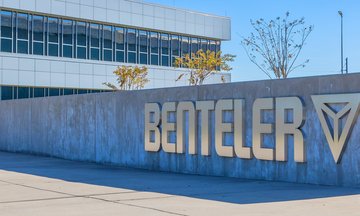Sustainability
at BENTELER
The BENTELER Group has been a pioneering leader in embedding sustainability into its operations and value chain.
We're moving towards
zero emissions
As a fifth-generation family business, we have been committed to combining economic success with social responsibility, employee orientation and ecological awareness for nearly 150 years.
Our Sustainability Strategy
We have integrated sustainability into our business strategy by focusing on customer needs, process efficiency, and innovation, to align our efforts with key sustainability priorities for both internal and external stakeholders. Based on a materiality assessment and alignment with the UN Sustainable Development Goals, we have developed a comprehensive sustainability strategy focused on climate change, circular economy, water, employees, working conditions, and business conduct, supported by action plans and targets to address environmental, social, and governance priorities across our entire value chain.
A few of our
sustainability highlights
Responsible use of resources
The conservation of resources is becoming even more important in our manufacturing: In 2024, we reduced the group's waste volumes by 6% compared to the previous year. We also made similar progress with water: The sites located in areas of high or very high water stress have significantly reduced their specific water withdrawals since 2019.
Sustainable product portfolio
Our portfolio has included a comprehensive range of products specifically for electric vehicles since 2014. This demonstrates once again how we are shaping the future in making mobility safer and more sustainable.
CLIMORE®: CO2-reduced steels and steel tube products
With our CliMore® brand of more sustainable steel and steel tube products, we are making an important contribution to a more climate-friendly future and helping our customers meet their sustainability targets. Doing more with less emissions – that's the future. CliMore®. More for the climate.
Sustainable mobility for all
With the foundation of HOLON, BENTELER underlines its ambitions in the global business with autonomous mobility. HOLON focuses on the production and deployment of fully electric, autonomous and inclusive movers.
Climate change: clean energy
Through intensified activities and measures, we already covered more than 50% of our electricity consumption in 2024 with renewable energy sources. This will be increased in the future by concluding Power Purchase Agreements (PPAs), generating our own emission-free electricity and purchasing certificates of origin.
Award winning commitment
Our BENTELER Steel/Tube Division was awarded the gold medal by EcoVadis, one of the world’s largest providers of sustainability ratings. This puts the division in the top 5% of companies in the “Manufacture of Pig Iron and Steel” category. BENTELER Automotive achieved its best result to date in the “Carbon Disclosure Project” (CDP) with a rating of “A” in 2023 as well as a silver rating from EcoVadis.
Green steel and green aluminium
We are also driving decarbonization in our upstream supply chain. In the steel sector, we have entered into various declarations of intent with our suppliers to source green steel. Plus, we also use green steel from our own electric steel mill in Lingen, which produces up to 75% less CO2 than steel produced via the blast furnace route.





